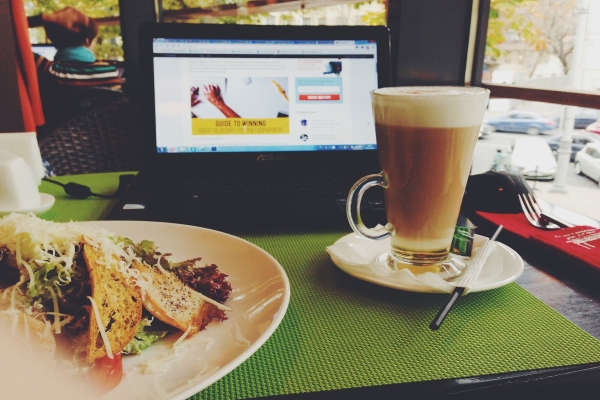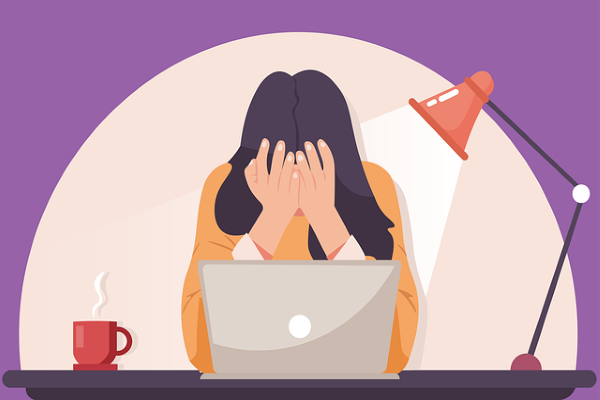“Why is it so difficult for me to eat healthy at work?” is a question recently asked by one of my colleagues. She was frustrated at not being able to eat better or healthy while at work, which I totally relate to. She got me thinking about it so much that I decided to look into reasons why most of us struggle with food during our working hours and what we can do about it.
You’re not alone if you’re feeling this way. Some stats from workplaces in the UK:
- 68% of staff say urgent tasks can be sufficient justification for missing lunch
- Over 33% of staff do not take their lunch breaks
- 56% do not have a designated area for lunch
- 34% eat at their desk or in meetings (virtual and face to face)
What does it mean to eat healthy?
Eating healthy means eating sufficient nutritious foods and drinks that are good for your health and wellbeing. It also means having healthy eating patterns – for example, knowing when, how often and how much we eat.
Why eat healthy? We need the right nutrients to support the normal functioning of our bodies, keep us healthy and productive at work or home. These nutrients include proteins, fats, carbohydrates especially fibre, vitamins and minerals. Most of these nutrients are found in food so it is important to consume them in the right amount, even when we are working which can take a significant portion of our day and energy.
Eating healthy also requires us to reduce excess intake of certain nutrients and foods that are not so good for our overall health such as salt, sugar, certain oils/fats and alcohol. The list may be longer if you are following a specific eating pattern such as vegan, vegetarian, keto etc.

Why don’t we always eat better or healthy at work?
Whether we are working from home, in the office or on site, lots of things can get in the way of us eating healthy during our working hours. The most common ones I found were:
- Work load
- Work location
- Time constraints
- Certain health conditions
- Stress and pressure at work
- Lack of healthy food choices
- Limited access to the food you prefer
- Influence by others, including marketing
It also appears that those who are not eating healthfully at work are likely to be struggling at home also. So if that’s you it is important to turn things around both at work and at home.

Tips for better and healthier eating at work
It is possible to eat well and healthy at work and some people already do! However, improving our eating habits will take some effort and maybe a little support from family and colleagues. Here are some things you can do Before work, During work and After work to help you eat healthier at work.
Before work: What can you do before you start work to help you eat better and healthier?
1. Stay informed
Firstly, it is important to learn all you can about food or healthy eating and keep up with developments. This knowledge will serve you well. For example, did you know that natural sugars in food can also spike blood sugar? Do you really know what processed food means or does to your body? Have you heard or read that vegetable/seed oils are not as healthy as we thought? Do you know about 5 A Day?
Know how to read food labels and understand the ingredients that go into some of your favourite foods. Question everything and try not to make your body an experimental ground for unfounded health advice.
Information is power and there is lots of it out there. However, be sure to get it from reliable sources and sites. If you feel the internet is a minefield, speaking to a nutritionist may be a better place for you to start. Make sure they are qualified and registered.
2. Set a few healthy eating goals
As you become more aware of what is healthier to eat, try setting some personal goals to help you eat better at work (and home). Start by acknowledging where you are, what you are already doing well, what needs to improve and then a few new goal(s).
For example, you may find that your lunch is always a supermarket meal deal which consists of a sandwich, small bag of chips and fruit juice. Although this is convenient, it is barely satisfying and often high in sugar and salt. With this in mind you could set a goal to eat a different meal for at least half the days of your working week. Another goal could be substituting the fruit juice with water.
Small steps are recommended but there is nothing wrong with bigger goals if you are up for the challenge and can sustain the effort.
3. Commit to healthy eating
It is easier to find information and to set some goals. It is much harder to commit and remain on track with healthy eating. Partly because you will be trying to change some habits you may have had for years. But, commit and persist anyway. Get your family, friends and colleagues to support you. It can be done.
Also, support yourself with other external resources. Atomic Habits has excellent suggestions on how to make small tweaks that can help you change. Also, The Obstacle is the Way shows you how to turn a challenge into an advantage. Social media might also have some inspirational people you can follow.
4. Budget for your work meals
I know all too well that living and working in a big city, such as London, is expensive. A very average takeaway lunch and drink costs me about £10. A five-day week costs over £200 a month. For some this is petty cash.
Take the time to budget for your lunches. You can eat well but affordably. Know how much you are willing and able to spend on them. Then get the best quality of food for your budget. This may involve some savvy shopping or getting the ingredients and making the lunches yourself, whether at home or in the office.
Remember the budget only works if you stick with it. Get help from a budgeting app or the good old spreadsheet. Also, Here are some meal recipe ideas to help with your food shopping.

5. Plan your lunch and other meals
Planning ahead for your meals can help you eat healthier and better at work. This can involve simple things like deciding to eat a falafel salad the next day from the café near your office. Or actually buying the salad before going into work.
It can also mean preparing and taking your meal to work. At times I have seen some colleagues bring in enviable curries and other times, simply a tin of tuna or soup and a bun. Try cooking food in batches to last you a few days. Or making an extra portion at dinner time, if batch-making is not for you. There are also workplaces with kitchens where you can make your meals.
I have found added benefits in prepping my food in advance. It helps me to visually see if I am eating enough (or too much) food as well as the right nutrients. It also gives me control over the ingredients going into my food, which is great because one of my personal goals has been to clean up my diet.
During your meal planning try to stay true to your healthy eating goals are. But remember, the ultimate goal is to eat enough nutritious food to keep you well, healthy and productive.
Remember meal planning will only be one thing on the long list of things you have to do. Especially if you work and have caring responsibilities for children and others. Try to fit your meals in though. If totally impossible, opt for buying and ordering healthier choices or ask for help from friends and family.
6. Careful when working from home
I have found meal planning falls to the side when working from home. But it is important to keep it up.
I stopped planning for meals as soon as I started working from home full-time following the Covid 19 pandemic. But months later I decided to resume it. I needed all the help I could find to stop the unhealthy habits that had crept up on me during home-working. I was eating throughout the day, eating too much and at times too little especially when there were food shortages or delivery problems. Meal planning did help.
A good number of people have a hybrid working pattern that allows them to split their working days between home, the office and/or field. Regardless of your work location, try to stick to your personal goals and be consistent with the healthy habits you are establishing. Change is harder in the absence of consistency.
During work: While at work, what can you do to help you eat better and healthier?
7. Start making healthier choices
Once you have the right knowledge, are committed to eating healthy and have some goals in place, it is time to actually make healthier eating choices. Have more of the good stuff and reduce the unhealthy. Limit excesses of anything but especially sugar, salt, oils/fats and alcohol.
Eat enough for lunch but avoid overeating which can cause food comas commonly seen as a dip in energy levels after a huge meal. Eating enough will also reduce the desire to snack. If you must snack, then choose healthier snacks.
Avoid substituting food for supplements. Where possible get all your nutrients from food. Only supplement if you are at risk of not getting sufficient amounts of a specific nutrient. For example, vegans may need to supplement their Omega 3 intake, those newly pregnant may need supplemental folic acid and we all need Vitamin D supplements over winter.
As you get better at healthy eating, be sure to increase your personal goals – don’t get too comfortable. Challenge yourself to make more and more healthy changes.
Also remember that food temptation is real. It can be found in a lot of places, including supermarket aisles, and in the food choices of your family or colleagues. Plan for how to deal with temptation.
8. Look beyond the work canteen
Workplace canteens are convenient and great. Most of them are for staff only. Meals are often subsidised or free. However, the food choices may not always be great or healthy. If this is the case, do aim to look beyond your work canteen for better choices. You can look in surrounding cafes, if there are any. Or order in healthier food.
However if the canteen is the only option (for example, you are in a remote location), consider giving feedback to the management or making menu suggestions to improve the food choices or quality. You may find a lot of your colleagues feel the same.
9. Ditch the regular choice
When some of us find something that works well, we tend to stick with it. However, this can make it easy for us to fall into the habit of eating the same thing regularly. And while that may be enjoyable or convenient, it would mean we are only getting the same nutrients over and over again.

Try to mix up your food choices. It will ensure you are getting the full range of health nutrients that your body needs. If you are stuck for ideas, speak to colleagues, friends or search the internet.
10. Handle your food effectively
Not all working professionals are keen to carry food to the office, especially if you take public transport or feel cooler than cool. But it can be done glamorously using stylish bags, which can only be good for your body outside and inside.
Consider your food packaging. Use or choose environmentally friendly, where possible. If you are using your own containers and cutlery, be sure these are safe and free of harmful materials such as BPA and other alternatives.
Be sure to store your food appropriately too. Most workplaces will provide a kettle, microwave and fridge as a minimum. If your food needs to stay chilled, consider how busy the fridge is. Are colleagues opening and closing it regularly or is it too full? You might consider using the freezer for a short period, if your type of food allows it.
11. Determine your eating time and frequency
Do you have working lunches, eat at your desk, on the go, in a meeting or behind the Zoom camera? You need to stop for lunch and step away from work, even for just a short while. Your body will thank you for it. Besides, it is provided for in your work contract and by law.
Are you able to plan for your lunch break or is this based on when a window of opportunity presents itself? Try to plan a regular slot for lunch. You could make this one of your healthy eating goals. You can use the time to practice mindful eating – good for your body and mind.
How often do you eat while at work? The general advice out there is to eat little and often throughout the day. However, this may not be possible or right for everyone. Most of what we eat causes a reaction in our blood sugar and insulin, for example. If we are eating all the time this means we are not giving our bodies a chance to bring these down, which can leave us feeling tired and at risk of health problems. Seek more information and advice if you want to know what is good for you.
12. Rethink dieting while working
I am not one for diets, mainly because they are hard to sustain especially while working. A healthier alternative would be for you to consider introducing fasting to your eating pattern.
There are two main types, intermittent fasting or time-restricted feeding. They have slight differences but both put no restrictions on what you eat but encourage changes on the time you spend eating. Fasting is ancient old and has lots of benefits including weight loss, improved insulin sensitivity and longevity. I have found that fasting fits well around work. In fact fasting is said to improve brain/cognitive function. You feel much sharper – rumour has it that Pythagoras, the famous Greek mathematician, required his students to fast before coming to his class!
13. Get support at work
I used to be part of an eating club at work where we shared recipes and brought in food to share. We also made sure to stop for lunch and eat together. Sometimes I did not want to prepare my food beforehand but the thought of others doing it too was hugely encouraging to me. We supported each other to eat healthy by sharing challenges and offering encouragement.

Consider joining an eating club at work, or starting one. Be sure it has healthy eating goals at its core. It is equally easy to start one that contributes money towards getting unhealthy takeaways delivered to the workplace!
A supportive work environment will also keep unhealthy distractions to a minimum. Most workplaces I’ve worked at have had a corner that never runs dry of cakes and all things sweet. Always colourful and easy to spot! Having supportive colleagues in such an environment is important. If nothing else, they will be sure to get healthier treats for the sweet corner and only in the necessary amounts.
14. Hydrate plenty
Like my mum used to say to us when we were growing up, try not to confuse your thirst for hunger.
A lot of us end up eating or snacking unnecessarily when what we really need is hydration. Make sure you take in plenty of fluids while at work. Coffee, tea, fruit juice are all options. However, plain water is best for hydration – after all our body cells are made of mostly water!
Aim for eight glasses of water a day. Also, have a bottle of water with you and sip it throughout the day. Every so often swish the water around in your mouth to wash away any acidic build up in your mouth. This will prevent enamel erosion or bad breath.
15. Handle stress at work
Address the root cause of stress, if it is causing you to engage in unhealthy eating habits while at work (or home). Remember the effects of stress might go beyond what you eat, and may include inadequate sleep and anxiety.
Drinking too much coffee is not advisable while stressed. It might help you feel momentarily energised but it also reduces the absorption of magnesium. Yet our bodies need plenty of magnesium when we are stressed!

After work : What can you do after work to help you eat better and healthier?
16. Consider an after-work snack
A healthy snack after work is handy. If, like me, you normally have your lunch at 1pm and finish work at 6pm, you will agree by that time you feel quite ready for your next meal.
A healthy after work snack means I have the energy to get home and make dinner, without raiding my fridge in hunger. Make this healthy. Yoghurt, nuts and fruits are all good options depending on your preference.
17. Be prepped for after-work drinks
It is a great idea to socialise with your colleagues. However, it is a bad idea to drink alcohol on an empty stomach, which is is likely to be the case seeing as most people are likely to have had lunch a few hours ago. Try to eat something healthy before drinking alcohol or with the alcohol.
If you must drink on an empty stomach, think through your drink choices. Consider one that has no alcohol or is low in alcohol.
Avoid drinking to excess, whether on an empty or fed stomach. It’s not good for your health and it’s never a good idea to drink too much at work drinks anyway.
Try to resist peer pressure during after-work drinks. If you do not want to drink alcohol, don’t be shy to ask for non-alcoholic beer or drinks. If appearances are important, speak to the waiter to serve up or present your non-alcoholic drink in a fancy way. It totally works.
18. Acknowledge your progress
Review your healthy eating goals at the end of the day or after a period of time. Well done if you have stuck to them! Reward yourself every so often but make the rewards healthy.
If you’re not happy about your progress, don’t give up just yet. Keep at it and you will soon make some progress that you are happier about. Remember sometimes the obstacle really can be the way.
In summary, this article looked at some tips to help you eat well and healthy while at work. To help you succeed we have suggested some actions for you to try before, during and after work. These include gaining knowledge about healthy eating, committing to eating healthier, meal planning and getting support from others to help you with your journey. Disclaimer: Please note that no part of this article constitutes medical or health advice, you will need to contact your health professional for that.

